China launches app for its own digital currency as it looks to expand usage

China has been running trials for its digital yuan or e-CNY. Now the People’s Bank of China is hoping to expand usage of digital currency by launching an e-CNY wallet app to more users in select cities. Photo taken on July 7, 2021 shows a digital Chinese currency logo at the World Artificial Intelligence Conference 2021 in Shanghai, China.
Costfoto | Barcroft Media | Getty Images
China’s central bank has launched a pilot version of a wallet app for the digital yuan in a push to expand its usage to more people.
The app is available on China’s Android app stores and Apple’s app store. It allows users to open a digital yuan wallet and spend the currency.
The digital yuan or e-CNY is a digital version of China’s sovereign currency and has been in the works since 2014. It is not a cryptocurrency like bitcoin but is instead issued and controlled by the People’s Bank of China.
So far, China has done a number of trials around the country in the form of lotteries where users in certain cities have been given a small amount of digital currency to spend. Some retailers, such as e-commerce company JD.com, have accepted it as payment in the past year.
But the digital yuan has not yet officially been rolled out nationally and there is no timeline for this.
The new app allows users in 10 areas including major cities Shanghai and Beijing to use it. Previously, only select users could use the app on an invitation basis. But now everyone can download the app, highlighting how China is trying to get more people to use the digital currency.
The “Beijing Winter Olympics areas” is one of the places that the digital yuan can be used, according to a notice on the app. The Winter Olympics, which takes place this year in the Chinese capital, has been one of the events that the People’s Bank of China has been targeting bringing the digital yuan to.
Still, the e-CNY app will face stiff competition from China’s two dominant digital payment apps — Ant Group’s Alipay and Tencent’s WeChat.